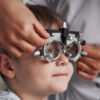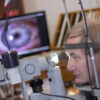We are TK&S Optometrists. It’s in our name, in our branding, on the door, on our emails, on our website but we know that – for many of you – we are just ‘the opticians’.
The word ‘optometrist’ is not part and parcel of everyday life. It is not a household name when it comes to job descriptions, yet it is exactly the right word to describe us.
So what is an optometrist?
Going by the agreed definition, optometrists, previously known as ophthalmic opticians, are primary health care specialists trained to examine the eyes to detect defects in vision, signs of injury, ocular diseases or abnormality and problems with general health such as high blood pressure or diabetes.
Simply put, we are the eye experts.
An optometrist is highly-trained and able to make a health assessment, offer clinical advice, treat many ocular conditions, prescribe spectacles and contact lenses and refer patients for further treatment, when necessary.
An optometrist typically studies at university for at least three years to gain a degree in optometry and must participate in a period of assessed clinical training in practice, before being deemed to have the knowledge and skills needed to be registered.
Once registered, optometrists have the opportunity to take a number of further qualifications such as Independent Prescribing (IP), Glaucoma and Binocular vision to develop their interests in specialist areas of practice, such as disease management, contact lenses, dry eye, myopia management or vision therapy and paediatric visual development.
All optometrists practising in the UK must be registered with the profession’s regulatory body, the General Optical Council.
Optometrists are required to fulfil continuing education requirements on an ongoing basis to maintain their official registration and stay current with the latest standards of eye care and the rapidly-evolving technology at our disposal.
So, we now know what an optometrist is but what is the difference between an optometrist and an optician or an ophthalmologist?
Well, an ophthalmologist is a medical doctor who commonly acts as both a physician and surgeon. They examine, diagnose and treat diseases and injuries in and around the eye and undergo extensive training.
Ophthalmologists generally train for five years at medical school for a degree in medicine before working for two years as a newly-qualified doctor doing basic medical training. Once this is complete, they undergo seven years of ophthalmic specialist training and sit examinations set by the Royal College of Ophthalmologists.
Meanwhile, a dispensing optician uses prescriptions written by an optometrist or an ophthalmologist to recommend and fit glasses and other ocular devices such as low vision aids.
All registered dispensing opticians have undergone a minimum of three years of academic and practical training to qualify. Only dispensing opticians registered with the General Optical Council can practise in the UK, use the protected title dispensing optician and are allowed to fit glasses to protected categories such as under 16s, patients registered as sight-impaired or complex lenses (without supervision). Some undergo further training to specialise in the fitting and supply of contact lenses. Dispensing opticians must also continue their education throughout their career in order to stay on the GOC register.
So, what does that mean for you as a TK&S patient?
Essentially, your eye examination will be carried out by one of our optometrists, (who have at least 20 years of experience and have various sub-specialities) who will carefully examine many aspects of your vision to gauge your overall eye health.
They will be able to prescribe treatments necessary to maintain optimal ocular health as well as glasses or contact lenses which will then be fitted by one of our experienced dispensing opticians.
Eye care professionals fall into three categories; ophthalmologists, optometrists and opticians. Each do different parts of the job but by working closely together we can all play a part in looking after your vision and ensuring your eyes stay healthy.





